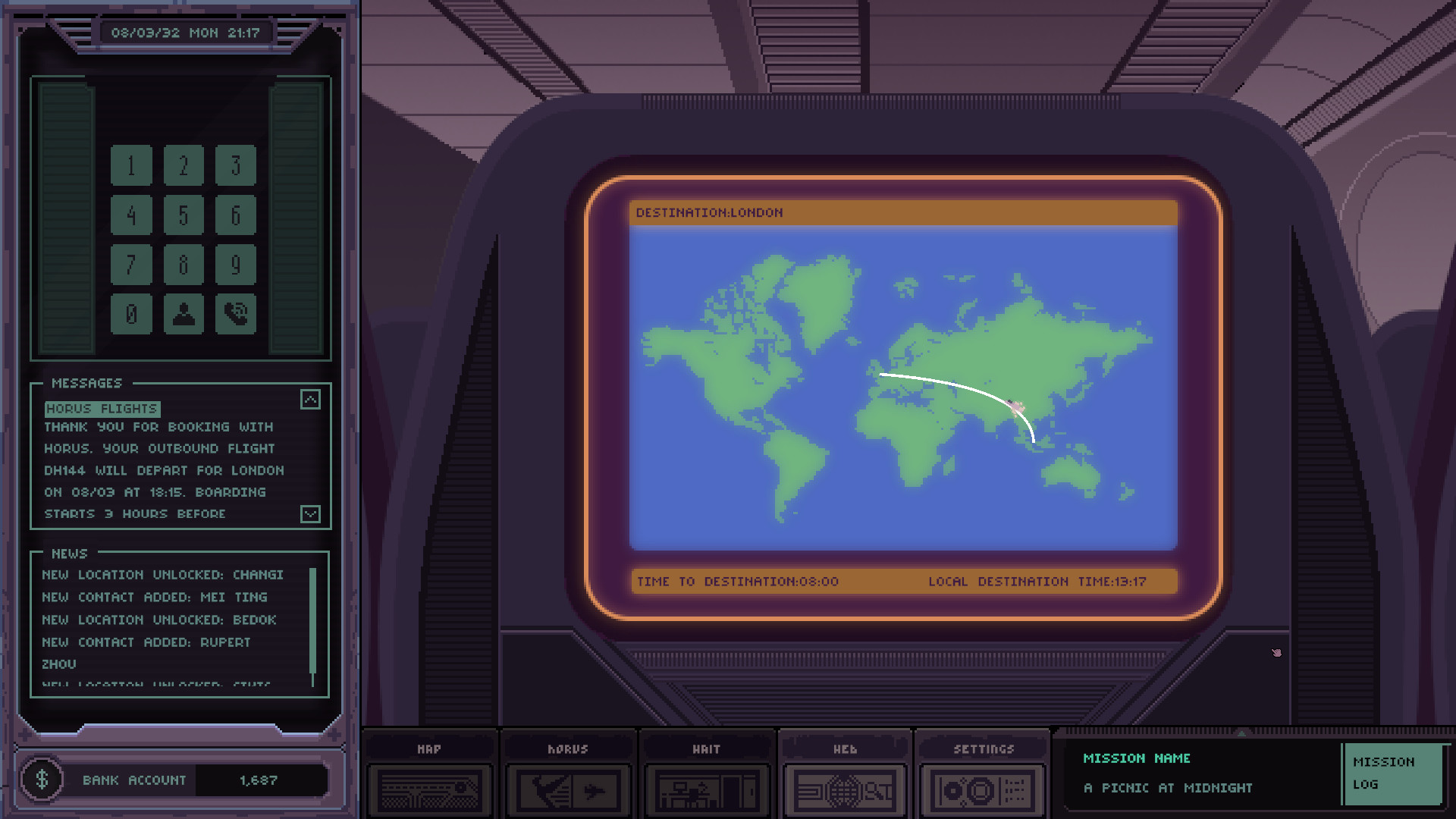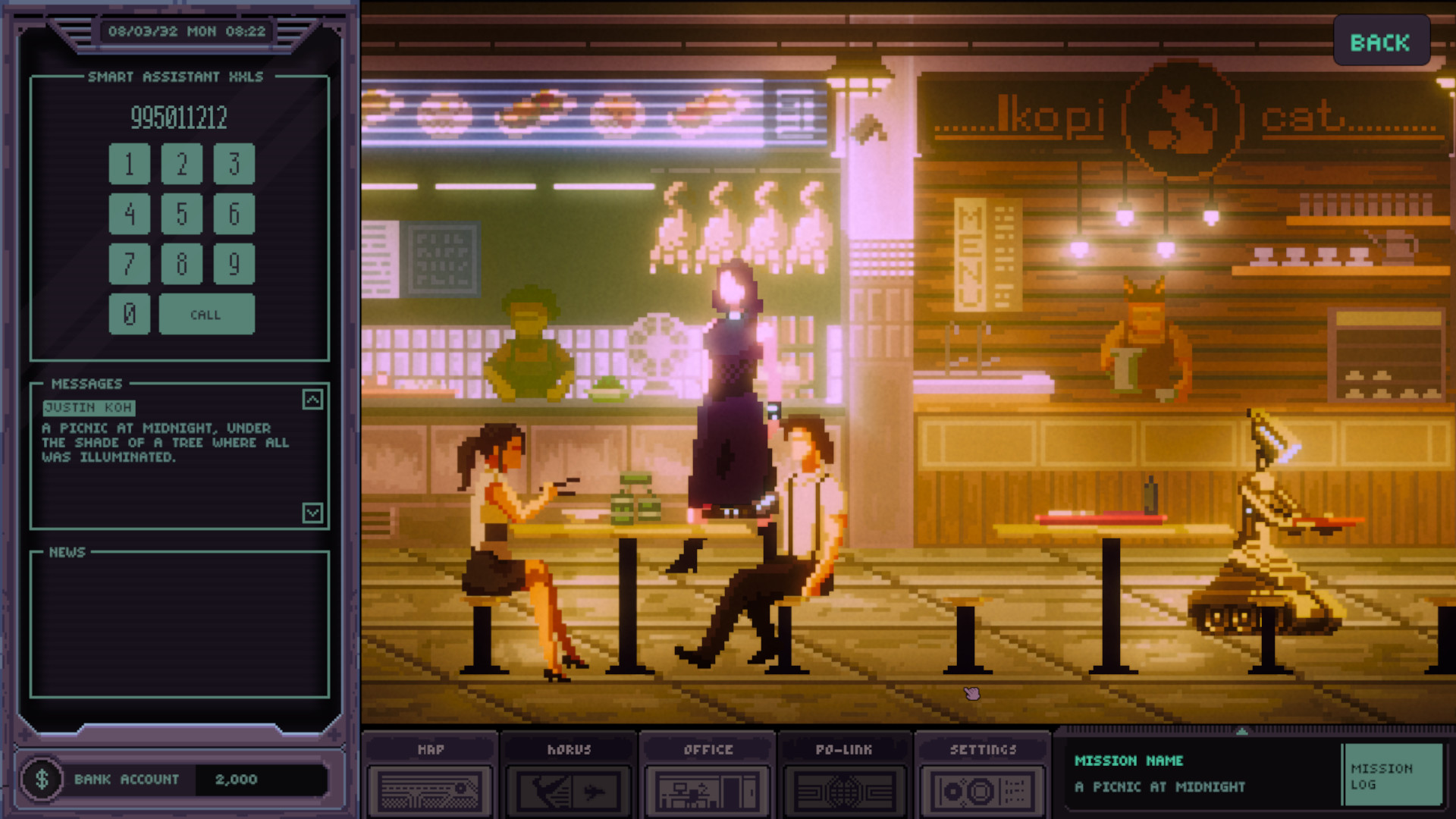Chinatown Detective Agency flips the script on point-and-click adventures by making you do the work
Chinatown Detective Agency turns you into a real-life private investigator

My first case in Chinatown Detective Agency has led me from Singapore to London. I've scaled a riverside residential block, and am now standing outside the apartment of a man who I believe has kidnapped a missing woman. Diplomacy is key in these situations, I tell my client over the phone as I make my advance – before a bullet bursts through the wooden door and zips right past my head. I unholster my handgun, kick the door in, and discover my suspect has his arm gripped tightly around the neck of a woman, his own weapon pressed tightly against the side of her head. I act fast, firing a shot at the man's shoulder, incapacitating him and freeing his poor victim.
This scene in the opening chapter of Chinatown Detective Agency unfolds at breakneck speed. And yet, it's far from the game's most exciting endeavours. You see, the most tantalising aspect of General Interactive Co. and Humble Games' point-and-click adventure isn't the climax of its heated exchanges, like the one outlined above, but the process of getting there. In essence, it turns the near-universal formula of the genre on its head.
Knowledge is power

Adventure games can be guilty of sending players around the block. Too often you're tasked with untangling contained but convoluted quests of trial and error, where you're forced to haplessly combine items or fumble through puzzles to unlock the next narrative fork. Chinatown Detective Agency, on the other hand, makes players undertake real-world research to solve its quandaries.
At one stage in an early investigation, for example, I was fed a clue in the form of a literary quote: "Of all men's miseries the bitterest is this: to know so much and to have control over nothing". A quick Google search informed me that these words are attributed to the ancient Greek historian Herodotus of Halicarnassus, whose name I was then able to search on an in-game library database. I found a book, an address, a name, and then another code, which led me to the exact location of the aforementioned hostage situation, and, ultimately, the safe return of the kidnapee as per my client's request. Without researching clues in the real world (or, indeed, a pub quiz league-winning grasp of general knowledge) very little is possible in the world of Chinatown Detective Agency. And it's all the better for it.

Admittedly, it's a risk in game design terms. Adventure games pride themselves on not holding their players' hands, wherein the solution to every puzzle exists in-game so long as you're willing to dig for it. The opposite is true here, as Chinatown Detective Agency asks players to do their own homework, where little can be uncovered in-game, as if they too become P.I.s in the mould of the game's protagonist Amira Darma – a one-time rising star at INTERPOL, who's now a private investigator based out of Singapore in the year 2037.
With its pixel-art aesthetic, cyberpunk trappings and neo-noir themes, Chinatown Detective Agency is as cool as point-and-click adventure games come, and while jumping to and from search engines to the game world itself has the scope to break immersion, the same principles that make pen and paper adventure games so satisfying apply here. You'll spend a lot of time scratching your head, studying cryptic messages and thinking: how the hell do I make sense of that. But the eureka moments are always worth it – both figuratively and, in game terms, literally, as each solved case fills your bank with in-game cash. To this end, keeping your head afloat in Chinatown Detective Agency is as important as dodging door-shooting rogue agents. On one misadventure, I misread a search result and wound up using the game's flight-booking system to travel to Istanbul instead of the UK, an error that cost me £550 in the process. With rent to pay on my detective agency office space, frittering away cash so easily isn't recommended.
Click outside the box

Beyond its retro visuals, Chinatown Detective Agency's innovative real-world research mechanic transported me back in time in ways I did not expect. I can remember being utterly perplexed while playing Metal Gear Solid on the PSOne in 1998, you see, when Colonel Campbell told me to locate Meryl's Codec frequency "on the back of the CD case". I spent hours searching for an in-game CD case item, before realising the Colonel was breaking the fourth wall and referencing the game's actual, real-world CD case. My young mind was totally blown, and the fact that Chinatown Detective Agency took me back to that moment speaks volumes for its inventiveness and ingenuity.
Sign up to the GamesRadar+ Newsletter
Weekly digests, tales from the communities you love, and more
From the great works of Double Fine to Wadjet Eye's wonderful repertoire of games, the adventure and point-and-click genres have enjoyed a renaissance of sorts over the last decade or so. The recent Return to Monkey Island announcement marks another milestone for video games of this ilk, and I reckon Chinatown Detective Agency has earned General Interactive Co. and Humble Games their place at the table. Judging by the game's reception on Steam since its April 7 release, its real-world research mechanics perhaps haven't landed with all players – at the time of writing, Chinatown Detective Agency boasts a "Mixed" review label on Valve's PC platform – but the fact that it's striving to do something new within a genre that first became popular 30 years ago is nothing to be sniffed at.
Get lost in the best adventure games available to play right now.

Joe Donnelly is a sports editor from Glasgow and former features editor at GamesRadar+. A mental health advocate, Joe has written about video games and mental health for The Guardian, New Statesman, VICE, PC Gamer and many more, and believes the interactive nature of video games makes them uniquely placed to educate and inform. His book Checkpoint considers the complex intersections of video games and mental health, and was shortlisted for Scotland's National Book of the Year for non-fiction in 2021. As familiar with the streets of Los Santos as he is the west of Scotland, Joe can often be found living his best and worst lives in GTA Online and its PC role-playing scene.


